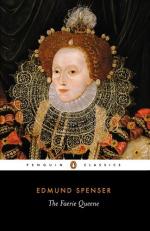181. NILUS. Pliny believed that the mud of the Nile had the power of breeding living creatures like mice. Hist. Nat. ix, 84. So Shakespeare, Antony and Cleopatra, II, vii, 29.
199. GENTLE SHEPHEARD. In this pastoral simile, Spenser imitates Homer’s Iliad, ii, 469, and xvii, 641, and Ariosto’s Orlando Furioso, xiv, 109.
208. THUS ILL BESTEDD. There is a similar combat in the old romance Guy of Warwick, ix, between the hero and a man-eating dragon.
217. HER SCATTRED BROOD. The poet here follows a belief as old as Pliny that the young of serpents fed on their mother’s blood. In this entire passage the details are too revolting for modern taste.
232. THE WHICH THEM NURST. The antecedent of which is her. In the sixteenth century the was frequently placed before which, which was also the equivalent of who. Cf. the Lord’s Prayer.
234. HE SHOULD CONTEND, he should have had to contend.
237. BORNE UNDER HAPPY STARRE. Belief in astrology was once common, and Spenser being a Pythagorean would hold the doctrine of the influence of the stars on human destiny.
239. THAT ARMORIE, the armor of the Christian warrior. Ephesians, vi, 13.
243. THAT LIKE SUCCEED IT MAY, that like successful adventures may succeed it. The word order is inverted for the sake of the rhyme.
250. TO FREND, as his friend.
254. AN AGED SIRE, the false enchanter, Archimago, or Hypocrisy, who is supposed to represent Pope Sixtus V or King Philip II of Spain. In general he stands for false religion or the Church of Rome. The character and adventure are taken from Orlando Furioso, ii, 12, in which there is a hypocritical hermit. The Knight at first takes Archimago to be a palmer, and inquires for the foreign news.
295. TAKE UP YOUR IN, take lodging.
301. A LITTLE WYDE, a little way off.
315. AN AVE-MARY, Hail Mary, a prayer to the Virgin. Cf. Luke, i, 28.
317. THE SAD HUMOUR, the heavy moisture, or “slombring deaw.”
318. MORPHEUS, the son of Somnus and god of sleep and dreams, who sprinkled the dew of sleep on the brow of mortals from his horn or wings or from a bough dipped in Lethe.
323. HIS MAGICK BOOKES AND ARTES. Monks engaged in scientific investigation, such as Friar Roger Bacon, were popularly supposed to use cabalistic books, and to make compacts with the Devil by means of necromancy, or the black art, as in st. xxxvii. Before the close of the century Marlowe’s Doctor Faustus and Greene’s Friar Bacon and Friar Bungay, both based on the popular belief in magic, were presented on the London stage.
328. BLACKE PLUTOES GRIESLY DAME, Proserpine, the avenger of men, and inflicter of curses on the dead. She is identified with Shakespeare’s Hecate, the goddess of sorcery, and with Milton’s Cotytto, goddess of lust. To this latter sin the knight is tempted.




